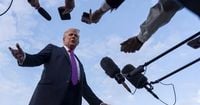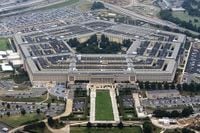In a move that has sent shockwaves through the American media and political landscape, Defense Secretary Pete Hegseth issued a sweeping new policy on September 19, 2025, that imposes unprecedented restrictions on journalists covering the Pentagon. The 17-page memo, obtained by multiple news outlets and detailed by The New York Times and The Washington Post, requires all credentialed press to sign a pledge not to report or even gather any military or defense information—classified or unclassified—unless it has been explicitly authorized for release by the Department of Defense. Violators risk losing their coveted Pentagon press credentials, effectively barring them from reporting inside the building.
The reaction from lawmakers was swift and fierce, cutting across party lines. Representative Don Bacon, a Nebraska Republican and retired Air Force general, didn’t mince words, calling the move "so dumb that I have a hard time believing it is true." He went on to warn, "We don’t want a bunch of Pravda newspapers only touting the Government’s official position. A free press makes our country better. This sounds like more amateur hour," referencing the infamous Soviet state newspaper. Senator Jack Reed, the top Democrat on the Senate Armed Services Committee, labeled the policy "an ill-advised affront to free speech and freedom of the press," adding, "This goes beyond attempting to suppress criticism—Mr. Hegseth’s goal appears to be eliminating a critical check on government corruption, unlawful practices, and the misuse of taxpayer dollars. American journalists are not, should not, and must not be mere stenographers for the party in power or the Pentagon itself."
Media organizations were equally unequivocal in their condemnation. The New York Times described the mandate as "yet another step in a concerning pattern of reducing access to what the U.S. military is undertaking at taxpayer expense." Reuters said its journalists were "deeply concerned" about the new restrictions, arguing that "any effort by the U.S. government to limit journalists’ ability to cover the news undermines fundamental First Amendment protections and constrains the free flow of information that is critical to informed public debate." The Wall Street Journal, The Washington Post, and NPR all issued statements denouncing the guidelines, with NPR Editor-in-Chief Thomas Evans vowing to "work with other news organizations to push back," hinting at a possible legal battle to come.
Mike Balsamo, president of the National Press Club, called the new rules "a direct assault on independent journalism at the very place where independent scrutiny matters most: the U.S. military." He stressed, "For generations, Pentagon reporters have provided the public with vital information about how wars are fought, how defense dollars are spent, and how decisions are made that put American lives at risk. That work has only been possible because reporters could seek out facts without needing government permission." Balsamo warned, "If the news about our military must first be approved by the government, then the public is no longer getting independent reporting. It is getting only what officials want them to see. That should alarm every American."
The Pentagon Press Association, representing journalists who cover the Department of Defense, acknowledged the new directive and announced it was reviewing the policy as of late September 2025.
According to Axios, the crackdown is part of a broader effort by the Trump administration to control the narrative and limit leaks. On September 15, just days before the memo targeting journalists, Secretary Hegseth released another directive restricting when, where, and how Pentagon and military leaders can engage with the public. This memo established a vetting process for all external engagements, giving the Department of Defense broad latitude to reject speaking invitations or events that might generate unfavorable news coverage. The guidelines prioritize organizations that "comport themselves professionally—even if they disagree with the Department’s positions," and emphasize the importance of sharing information with "broad audiences" to ensure a wide range of perspectives are heard. However, the memo makes clear that engagement is not required with institutions solely aligned with the Department's views, suggesting at least a nominal openness to dissenting voices.
Yet, the practical impact has been stark. Since early 2025, Hegseth’s press office has systematically reduced press access and transparency. In late January, several mainstream media outlets—including NPR, NBC News, Politico, and CNN—were removed from their Pentagon workspaces, replaced by a new rotation of conservative and pro-Trump outlets such as Breitbart News, One America News Network, Washington Examiner, Daily Caller, and Newsmax. While the changes did not revoke press credentials, they did strip many journalists of their office space inside the Pentagon, a key asset for timely reporting and access to officials. The Correspondents’ Corridor, long seen as a symbol of the Pentagon’s commitment to informing the public, has now become a battleground for media access and government control.
Veteran Pentagon reporters and press freedom advocates have described the new rules as the most serious threat to independent journalism at the Defense Department in decades. Seth Stern, director of advocacy at the Freedom of the Press Foundation, told The New York Times, "This policy operates as a prior restraint on publication, which is considered the most serious of First Amendment violations. The government cannot prohibit journalists from public information merely by claiming it’s a secret or even a national security threat." Katie Fallow, deputy litigation director at the Knight First Amendment Institute at Columbia University, called the directive part of "the Trump administration’s broader assault on free speech and press freedom," adding, "Any journalist who publishes only what the government ‘authorizes’ is doing something other than reporting." Kenneth Roth, former executive director of Human Rights Watch and now a visiting professor at Princeton, went further: "In Trump’s Pentagon, journalists who venture beyond reporting official propaganda now risk having their credentials revoked."
Reporters themselves have voiced alarm. Konstantin Toropin, Pentagon correspondent for the Associated Press, noted on social media, "Denying access to the Pentagon makes covering our military, our troops, and our actions abroad harder. Full stop." He warned that the new rules surrounding unclassified information—often marked "CUI" for controlled unclassified information—are "an incredibly broad and ill-defined rule that could be easily abused." Barbara Starr, longtime Pentagon correspondent for CNN and now a senior fellow at USC, told ABC News, "The effort is extremely troubling because it’s being done in an era of unprecedented public hostility from the secretary of defense to the news media."
President Trump, when questioned about the policy as he departed for a memorial service, appeared to distance himself from the directive, saying, "No, I don’t think so. Nothing stops reporters. You know that." But Hegseth has defended his approach, asserting on social media, "The ‘press’ does not run the Pentagon—the people do. The press is no longer allowed to roam the halls of a secure facility. Wear a badge and follow the rules—or go home."
All of this comes against a backdrop of heightened concern about government secrecy and accountability. Legal scholars and watchdog groups warn that restricting independent scrutiny of the military undermines the public’s ability to oversee decisions of war and peace. As the Pentagon further limits briefings—holding fewer than ten on-the-record sessions since January—critics argue that the very notion of a free and independent press at the heart of American democracy is at risk.
As the dust settles, one thing is clear: the battle over press freedom at the Pentagon is far from over, and its outcome will shape not just the future of military reporting, but the broader relationship between government and the people it serves.


